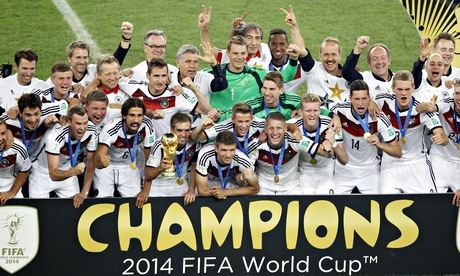Germany’s World Cup triumph a victory for intelligent design
-

- The Guardian, Monday 14 July 2014

Oh, Germany. You left it horribly late. But then, after 24 years, €1bn invested and several half-cut new dawns along the away, you were always likely to. Welcome to the footballing future. Not only does Europe now have its first champions on South American soil; it also has the most European of all European champions: a sporting triumph of controlled, superbly engineered uber-Europeanism applauded at the end by both Angela Merkel and Michel Platini inside the portable corporate mega-drome that was once the distinctively Brazilian Maracanã.
This was an absorbing, if not quite free-flowing final in which Argentina played with great heart and tactical intelligence, breaking from deep and making enough chances to win the game in normal time. Indeed, as the match crawled through an increasingly fretful second period there was a dawning sense that this simply was not meant to be for Germany, who had seemed anxious at first and enervated at times later on.
There is a depth to this German squad, though, not just of resolve but of high-class attacking talent. What a goal Mario Götze’s winner was when it came, from a player who had been a genuine menace with his subtle passing and swaying, roly-poly lateral movement ever since his introduction as a late substitute. There is evidence even here of Germany’s wealth of talent: the substitute who scored the winning goal in the World Cup final also happens to be a £31m Bayern Munich player, a wonderfully talented No10 who has often found himself crowded to the fringes by the weight of competition in his position.
The finish itself also told a story in miniature. Aged 22, Götze is a product from boyhood of the modern German academy system. His habits are those of the Deutscher Fussball-Bund’s supremely successful coaching programmes, a player who fits not just the technical requirements but the favoured physical type, a short, scurrying, perfectly balanced rubber ball of an inside forward. As André Schürrle’s cross came from the left Götze produced two expert touches. The first on his chest was superbly cushioned, his body angled to drop the ball without breaking stride. The second saw the ball nudged with loving precision across Sergio Romero and into the corner.
If it felt a little like a training-pitch goal, then this was also oddly appropriate, as was the goal’s resemblance to Andrés Iniestas’ winner in the final in 2010. Both goals came from a well-executed finish across the goalkeeper, Iniesta’s in the 116th minute, Götze’s three minutes earlier here. Both were are also products of the kind of hard-won technical skill that looks less and less like luck and more and more like a heavily resourced, intelligently geared sporting system coming to deserved fruition.
At the final whistle Germany’s substitutes rushed on to the Maracanã pitch waving their arms above their heads in shock that tells a great deal about the spirit of this team, the magnitude of the moment and also perhaps just a little bit about the wider pressures of Germany’s position coming into this tournament. Certainly Jogi Löw’s expression at the final whistle was something close to blissful disbelief, Germany’s manager strolling the fringes of the pitch, grinning goofily and looking slightly wild in a moment of triumph that has been eight years and a great deal of wearing expectation in the making.
It has been possible to feel a little sorry for Löw, for all his genius manqué stylings – the polo necks, the highfalutin chat, the attitude, if not before now the medals of a genius. But there is a burden too in being tasked with transforming such concerted, systemic investment into victory on the pitch. Löw has lifted that now. Part of the national structure for a decade, he will feel not just vindicated but overwhelmingly relieved too.
Victory here was always likely to be presented as a triumph of that frictionless German system, and indeed it makes complete sense that Germany should win the World Cup. This is the most perfectly calibrated, most relentlessly first-world system for producing high-class footballers yet devised, a piece of intelligent design that has now flowered to its logical end point.
There is as always a very obvious lesson here for the mismatched Premier League-FA shemozzle that governs English football. If you build it – and spend €1bn on enlightened facilities – they will come. And so they have. Of this current squad 14 players, including the top goalscorer (Thomas Müller) and overall midfielder of the tournament (Toni Kroos) were all under-13 or younger when the DFB reorganised German football. Germany’s top tier has put the bottom line to one side, invested with speculative good sense and ended up hugely in credit. What riches!
And yet despite scooting through to this final on a surge of attacking success Germany found themselves caught up in a tight, gristly but still absorbing match. As the match kicked off on a lovely sunny Rio afternoon there was the thrilling spectacle of Argentina’s fans inside this open, shallow-tiered giant seashell of a stadium singing that great bouncing sing-along of a national anthem but the early pattern was clear: Germany took possession while Argentina broke swiftly when they could, pressing four times with purpose in the first half down Germany’s left. One thing was clear: Argentina were not afraid, as Brazil had apparently been terrified, of this fluid, feather-footed footballing superpower-in-the-making. And yet it seemed inevitable, logical, even a little irresistible that Germany should triumph: and fitting, too, it should come with a show of strength in depth.
Germany’s previous World Cup victories have all had something era-defining about them. In 1954 West Germany were still a middleweight football power prior to a final against Hungary that was decided by Helmut Rahn’s late goal, and captured in the famous, near-delirious commentary (“Tor! … Tor für Deutchsland!”). Twenty years later victory for the great team of Gerd Müller, Paul Breitner and Franz Beckenbauer was the first of an astonishing run of finals over the next 16 years. The 1990 victory against Argentina arrived with a sense of an emerging Germany on the verge of a more substantial dynasty. Or not as it turned out: the intervening 24 years have seen one European Championship win and a generational retrenchment.
This was an utterly merited World Cup victory, reward for the entire spectrum of German football, from clubs to football association, players to coaches. The challenge for the rest of the world is to interrupt the next entirely logical step – which is many more of the same from here.

